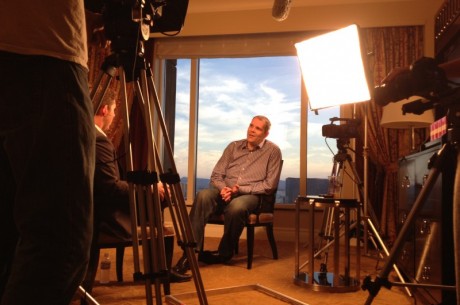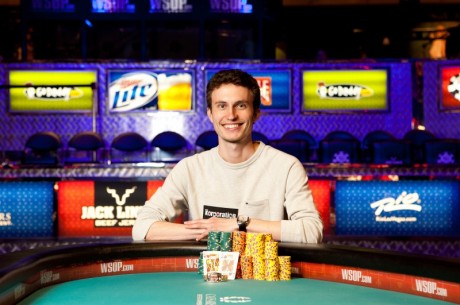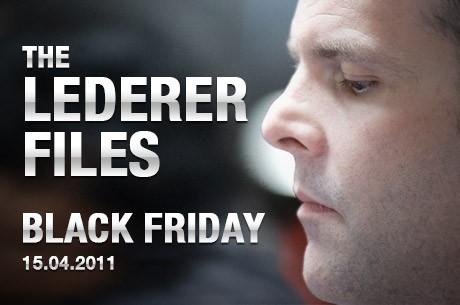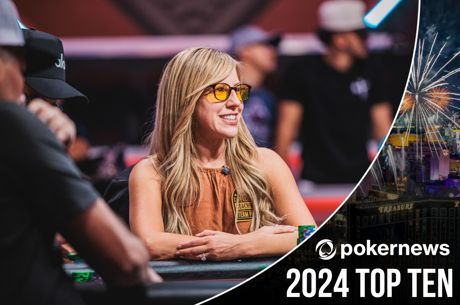The Lederer Files: The Process and Opinions
Interviewing Howard Lederer for The Lederer Files was by far the most difficult project I have worked on. I'm extremely proud of the work that was done by the PokerNews team to turn this from an idea into a finished project in under two weeks. Obviously, I've paid close attention to the feedback, criticism, and debate that this interview ignited, and while I'm not going to respond to every forum post or tweet, I will address some of the major questions people seem to have, as well as give my opinions on Lederer's story, and the organization's demise.
To start, I'll address some of the queries wondering if this was in any way staged, or whether or not Lederer had to approve questions or the final edit. Lederer did not have any approval of questions and did not see any list of questions leading up to the interview, nor did he have any say in the process of editing the final piece. I mentioned in my intro post that I did spend time with Lederer leading up to the interview, but this was not done to prepare him for what I was going to ask, but more to develop some rapport with him and get a firmer understanding of Full Tilt's history and the timeline, because a lot of public information is riddled with inaccuracies. We needed to get to know one another a little bit to ensure he was comfortable opening up.
In the time spent with Lederer off the record, there were certainly some stories discussed that he asked be off the record. None of these stories or discussions that were off the record had much relevance to the overall interview, and there was nothing that scandalous in nature that was discussed. It was mainly information from others, and he didn't feel comfortable discussing without their consent. One subject in particular has now come to light: Erik Seidel's $5 million that John Juanda tweeted was stolen by Full Tilt Poker management. This information was something I was aware of, and Lederer felt it should be discussed, but Seidel didn't want the information public, for reasons to which I am not privy. Lederer has since contacted me and let me know that because of Juanda's tweet, it was OK for me to confirm that this story was in fact true.
If I had to start from scratch and go through the process over again, the biggest change I would have made would have been to conduct the interview over two days not one. We were in the hotel room for an extremely long time on the day of the interview, and by the end, I felt exhausted, and I know the crew that was there, and Lederer, can all attest to that. Trying to maintain focus with such difficult subject matter for eight hours, under lights with cameras rolling, is not easy. Had the sessions been broken up over two days, I think I could have reviewed the first day's footage with some of the PokerNews team to find areas to come back to and push a little harder to dig for more information.
I'd also have pushed for a longer period of preparation leading up to the interview. The team and I essentially had seven to eight days to prepare. I feel that we spent the time wisely. I tried to read as much as I could. I spoke to people I felt had insight about situation, but in the back of my mind I was always worried that Lederer might change his mind or get cold feet and decide to not sit down and talk to us. That fear of losing the opportunity pushed us to work quickly and to focus on getting the cameras rolling to avoid losing the story altogether. That pressure, coupled with our desire to keep the project extremely confidential, hindered our ability to have everything in place as perfectly as we all would have liked. The scope of this project was so huge, and of course I would have loved to have a professional prosecutor, or some crackpot legal team helping us out, but that was just not in the realm of possibility for this unfortunately.
The feedback and criticism have all been fair. After watching the interviews and trying to be impartial, I agree with a lot of what's been written and think there are plenty of spots where I could have been tougher or followed up more in depth. That being said, I don't think following up hard in certain spots would have changed the overall outcome of the piece or provided any additional insight. It certainly may have with some sections, but all in all, I felt it was important to cover as much as possible and not sit there and hammer on why he claims "he didn't know," or that "it wasn't in his area of expertise."
I'd disagree with many of the critics who felt that I should have gone in with guns blazing, trying to hit him in the stomach at every opportunity. Sure I'd be revered by the community, but what exactly would it have accomplished? Although Lederer didn't have anyone from his legal or PR team at the interview, the man is still under the intense scrutiny of the Department of Justice and his answers would reflect this no matter what I asked or followed up with. There was no way I'd be able to back him in to some corner where he'd incriminate himself in a way that the community was dying to see. So, in my opinion, the play was to attempt to open him up as best I could, and allow him to feel comfortable in giving as much information as we could get out of him. I think, by using that method, we brought a lot of information to light and perhaps convinced some other people to feel more comfortable about speaking out in the future.
In regard to specifically not asking why Lederer or other shareholders did not return distributions received, is, in hindsight, an obvious core question that was missed. I've been beating myself up since before we released the videos, and all I can say is, I'm sorry I missed it. It's almost a situation where you are desperately looking for your keys in every nook and cranny, but they were in your hand the whole time. I pushed myself so hard leading up to this interview, and I certainly am as disappointed as some others are that I missed it. My opinion on the distributions is that giving back distributions would have been very complicated. Who is to decide which shareholders should give back and which should be allowed to keep their money? I think the topic on player loans was much more pertinent because loans are meant to be paid back while distributions are not. The point of any company is to make money and make the shareholders money. Based on Lederer's assertion that there was almost chaos amongst the shareholders in regard to accepting certain deals, I would assume the topic of owners giving back distributions would have furthered the internal struggles between members and ultimately lead to a loss of focus over working out a deal to get the players paid. All that said, though, I should have asked.
There have also been many questions as to why we didn't release the full, unedited seven hours. The answer is simple: the goal of this interview was to inform as many people as we could about Howard Lederer's take on Full Tilt Poker, Black Friday, and the 15-month aftermath. Running an uncut seven-hour interview would have left thousands of people uninterested, would have led people to fast-forward to get to the parts they wanted to see, and not do the story justice. However, aside from Part 1, which very much cut together a lot of info into a short time span, the rest of the interview was left almost untouched. The edits were eliminating dead space, getting rid of some redundancy in Lederer's answers, cutting my long-winded, rambling lead-ins, and providing much better flow. The original idea was to create a 60- to 90-minute finished product, which after spending two days reviewing the footage and looking at a first edit, seemed impossible.
PokerNews will be releasing a written story next week, essentially recapping the interview for those unable to spend over three hours watching. In many ways, I think the narrative will make it easier to get through a lot of information quickly, and some of the material that was left on the cutting room floor will be brought to light. In particular, I think the early days at Full Tilt Poker will get a lot more attention.
As for my take on Lederer's story and the entire debacle, one of his first answers really resonated with me when he talked about being one man in a very complicated story, and that he doesn't have all the facts. I felt that this was true and a fair assertion. A group of poker players decided to start and run a business, and the business grew to levels that nobody, including the owners themselves, could ever have imagined. Everyone, with Ray Bitar leading the way, was in way over their heads but were all too stubborn to realize that the company would have been much better off in the hands of successful, qualified executives. The whole group of 23 was making a killing with distribution checks, so with so much money coming in, even with all the red flags and questions in regard to Bitar and others qualifications to lead the board, and the membership simply turned a blind eye. This was their biggest mistake and what Full Tilt Poker customers and the poker community should be appalled by.
While it's easy to point the fingers at Ray Bitar and the board of directors, and don't get me wrong, I certainly feel they should accept a large part of that blame, why, if so many shareholders were unhappy with Bitar, Lederer, and the board, was another board election never held. According to Lederer, a board election was listed in the Tiltware operating agreement as something that needed to be done each year. When Phil Ivey stepped down from his board seat weeks after the company was founded, why didn't someone fill that spot? According to Lederer, the operating agreement called for a five-person board to be elected each year. However, the company was operated for almost its entire history with a four-person board and no yearly elections. That is something I want to learn more about from shareholders willing to speak out in the future, because according to Lederer, nobody wanted to step up and take the fifth seat at any time, and there was no election or change in the board other than the Transition 2.0 board presented in the summer of 2011. To those owners who were, and are still vocal about the management, I'm curious about why they didn't take the empty board seat and try to make a difference?
Finally, I feel like one of the biggest errors the company made, on top of never accepting the need for professional management, was allowing deposits to still be made post Black Friday. This is something, that even after listening to Lederer tell me he was not able to stop this from happening, I feel that should have priority number one. Someone needed to step up here, and no one did. I buy the argument that the company had to remain well-enough in tact to get a deal done with potential investors. Bankruptcy, from what I understood from Lederer, would have led to players getting back maybe pennies on the dollar, so I understand the need to continue keeping the operation itself in tact. That being said, I think immediately putting a stop to all play on the site and shutting down ROW deposits would have done wonders for the company's credibility and standing in the eyes of the public and poker community. The company could remain in tact but simply at a standstill. Pay the rent, pay the employees, pay your lawyers working to get a deal done, and show investors how strong your assets are, but immediately cut off any salaries to executives involved in getting the company into the mess, namely Ray Bitar. Everybody made mistakes, and I think had the company shut down in some capacity and prevented further customers from getting stuck, the community would be much more willing to accept an apology and forgive those who ran Full Tilt Poker into the ground.
There is sure to be a ton of further speculation and people looking to get their stories told. And to facilitate this conversation, I'd suggest some sort of filmed or recorded roundtable discussion. Let's get the people battling on Twitter together in to a room and hear them out. The poker media should provide two moderators from different sites and go through all the issues. I think we'd finally begin to sift through the web of misinformation that's been circulating for the past 15 months. I'm willing to work as hard as I can to get this done, and I'd urge anyone interested in participating to contact me.
I want to thank all of my colleagues in the poker industry, my friends and family, and the dozens of people at PokerNews who all helped make this project possible. Hopefully, it's just the start of a lot more like this to come.
Disclaimer: The thoughts and opinions expressed in this article are those of the author and do not necessarily reflect those of PokerNews.
In this Series
- 1 The Lederer Files: An Introduction
- 2 The Lederer Files: The Beginning of Full Tilt Poker
- 3 The Lederer Files: The UIGEA, Segregated Accounts, and Retirement
- 4 The Lederer Files: The Backlog and Black Friday
- 5 The Lederer Files: Black Friday Aftermath, the Search for a Solution
- 6 The Lederer Files: The Phil Ivey Lawsuit, Transition 2.0
- 7 The Lederer Files: Outstanding Member Loans, Groupe Bernard Tapie Complications
- 8 The Lederer Files: PokerStars Saves the Day, Apology to Full Tilt Poker's Customers
- 9 The Lederer Files: The Process and Opinions
- 10 Recapping The Lederer Files — Part 1
- 11 Recapping the Lederer Files — Part 2








